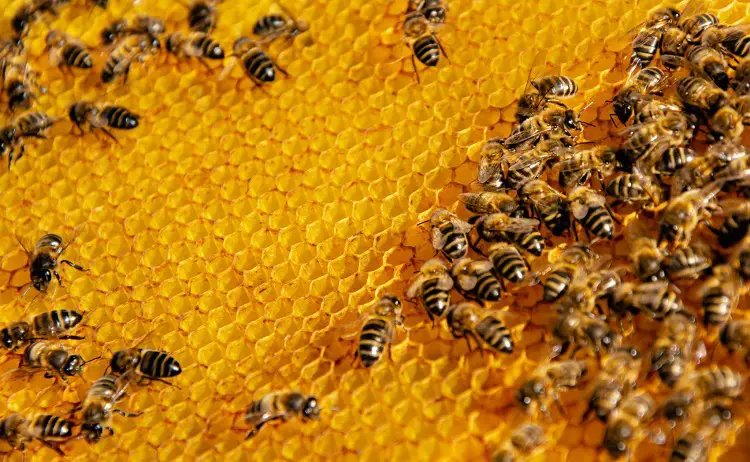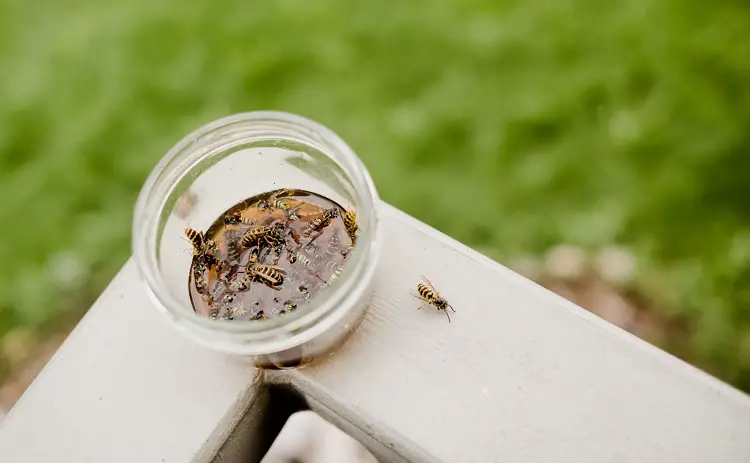Questions like does killing a wasp attract more sounds very interesting, especially to one who wants to know more about wasp and is interested in the lifestyle of wasps.
So, does killing a wasp attract more? The answer is a YES. The reason is that the dying wasp releases a chemical or pheromone when one kills a wasp.
The function of the chemical or pheromone is to alert the other wasps that there is danger and that they should be on the lookout. There is an enemy in sight.
You know what happens to an enemy, right? That is what happens to you when the wasps come to investigate the cause of the distress.
Table of Contents
- Does Killing A Wasp Attract More- Explained?
- How To Eliminate Wasps Without Killing Them
- 22 Frequently Asked Questions About Wasps
- Conclusion
Does Killing A Wasp Attract More- Explained?
Killing a wasp attracts more, and it does because of the pheromones that are released courtesy of the killing of the dead wasp, and when it is released, nearby wasps are released.
Instead of getting the others to run away or seek safety, the released pheromone acts as an attractant to others, making them become interested and involved in the investigation of the cause of the distress.
So when you kill a wasp or wasps, just remember that it is a good way to attract and get attacked by a swarm if the nest is nearby.
So to avoid being stormed by a legion of wasps, it is advised that you trap the straying or disturbing wasp and keep it under a glass.
When you do so, it prevents it from returning to the nest and from telling the others where to find your food.
How To Eliminate Wasps Without Killing Them

Generally, the best way to eliminate them is to avoid and ignore them. However, this may sound impossible, especially if your house faces a wasp infestation.
Thankfully, there are practical non-lethal ways to eliminate wasps in your home.
And while only some of these methods are as effective as an exterminator, they can help protect the already endangered wasp population.
1. Homemade Wasp Repellant
A homemade repellant can be made easily and should scare away most insects, including wasps. Peppermint oil and olive oil are both repellents that wasps hate.
Next, mix a few drops of peppermint oil with a teaspoon of olive oil. Place the mixture in a spray bottle, use it near wasps or their hives, and watch the wasps fly in the opposite direction in your house.
Alternatively, using eucalyptus or other essential oils can help repel the wasps. Or, if you want a more homemade solution, vinegar can do the job just fine (instead of peppermint).
Even though vinegar might not be as reliable as peppermint, it’s a good substitute.
2. Fake Wasp Nest
You can prevent wasps from nesting anywhere around your house by putting a few fake wasp nests around it.
Wasps are extremely territorial and won’t take over any already populated area.
Moreover, existing wasps may also leave your home and never return, so try to avoid placing them directly near another nest while the nests are still active, or else you will risk getting attacked by a swarm of angry wasps.
3. Plain Water
This may surprise some people, but plain water is extremely effective when dealing with a wasp nest. To encourage wasps to relocate, you can use hoses to enable them to build nests in dry, protected areas.
To accomplish this, position yourself safely, set your hose to a rain-like setting, and soak the nest until every single wasp has left.
4. Nest Relocation
You can relocate existing wasp nests from your house to another location if you have nerves of steel.
Doing so is usually dangerous, and you should seek a professional contractor for help. Just ensure to find a contractor that focuses on relocation instead of extermination.
But, if you decide to do it yourself, you must wait until dark before attempting the relocation.
It would be best to use a large plastic bowl to contain the nest and a sheet of plastic to cut the nest’s connection to its perch.
Once you have found a suitable location, gently place the nest down and remove the lid after an hour.
Related Post: How To Get Rid of Wasps in Your House (Practical Steps)
22 Frequently Asked Questions About Wasps
Do wasps know when you kill one?
Yes, wasps are aware when you kill one of them. The pheromone released by the dying wasp contains enough information to track you and get justice for the dead wasp by attacking you.
Why shouldn’t you kill a wasp?
One of the reasons why you shouldn’t bother killing a wasp is because they help you get rid of insects and bugs from your surroundings.
How do they achieve this? Wasps are predators, and they feed on insects and bugs that you also don’t want around.
Wasps do these things happily. They aid farmers and gardeners by killing flies, caterpillars, and the enemy of every gardener or farmer, the aphid.
If you are sure these wasps aren’t bothering you, then there’s no need to eliminate them.
Do wasps seek revenge?
Do wasps seek revenge? There is no scientific backing for this, but it is a well-known fact that wasps rally together to protect their territory and colony.
Do wasps remember who they sting?
There are possibilities of wasps remembering who they sting, but it is more common in a colony of wasps with many queens.
So it simply means that wasps with many queens will remember your face as they sting you.
Do wasps get angry?
Sure, they do get angry, especially when they have this feeling that they are threatened.
It could result from constantly waving arms as you try to eliminate them. It could make them feel threatened hence resulting in getting them.
Once wasps get angry, their defense mechanism releases pheromones that signal other wasps in the colony.
Do wasps even serve a purpose?
Sure, they do serve a purpose. They provide us with free, eco-friendly natural pest-control services.
Should we live in a wasp-free world, we need to use more toxic pesticides to control the insects that eat our crops and carry diseases.
Wasps can also serve as pollination agents; we know how useful pollination is to man.
Will wasps come back to sting you?
Yes, they can, and the fact is that they can sting multiple people multiple times during their lifetime.
A wasp’s stinger is different from a bee’s stinger. Nature made their stingers able to be used repeatedly, especially when a possible threat occurs multiple times.
When this happens, they use their stinger to stab the intended prey or potential threat like a small needle.
Why do wasps pick up their dead?
Wasps pick up their dead and perform these as a sanitary measure that helps prevent the spreading of disease or infection throughout the colony.
Can wasps hold a grudge?
Sure, they do, especially once there is an attack on their colony. If you do not completely kill all members of a wasp nest, they will return.
When they return, you have a bunch of angry wasps with grudges against you, and you sure know they are coming for revenge.
Do wasps want to hurt you?
Wasps do not intentionally want to hurt you. They do it when they feel threatened, so their attack becomes a survival strategy.
Why do wasps follow you?
Wasps will follow you once you disturb their Flight Path. Wasps belong to the same order as ants and bees, called Hymenoptera.
One common feature of these insects is that they can sometimes be aggressive. If you walk through their flight path, they’ll come after you, and it doesn’t matter if you intentionally or unintentionally disturb them.
What should I do when a wasp is flying around me?
All you have to do is to remain still if a wasp approaches you. If you need to run away, do so in a straight line without flailing your arms. Ensure that you look out for your head and face. These are their target areas.
What should I do if a wasp lands on me?
Do nothing if you have not disturbed the wasp nest, and it randomly lands on you. Don’t move. The wasp will walk around and investigate a bit then it will leave. If you HAVE disturbed its nest, swish it off and run for your life!
What happens if I kill a queen wasp?
When you kill the queen wasp, what happens is that the colony continues. If a nest has already been constructed, and the colony exists, killing the queen wasp will not solve the issue.
How can I treat wasp stings?
There are a variety of treatments for wasp stings. Wasps play an increasingly important role in pest control for farmers.
What keeps wasps from coming back?
Besides spearmint leaves, wasps hate the smell of thyme, lemongrass, and eucalyptus. We recommend you grow these plants to prevent wasps from coming near your house. You can also use clove, peppermint, and other essential oils to eliminate wasps.
Why do wasps pick up their dead?
In addition to protecting the colony from disease, the behavior serves as a sanitary measure to prevent infection from spreading.
Do wasps hurt people for no reason?
Wasps rarely sting for no reason. They will plunge their venomous stingers into human flesh whenever they feel threatened. This happens when people (sometimes even unknowingly) get too close to nests.
What’s the difference between bees and wasps?
There is one main difference between wasps and bees: wasps feed their offspring’ meat’ in the form of other insects – especially larvae, while bees feed their offspring pollen and nectar (although there are exceptions).
Do wasps make honey?
Yes, a small group of wasps found in South America is known to make honey.
Which wasp has the most painful sting?
According to a study comparing the pain of 96 insects’ stings, the tarantula hawk wasp’s sting was the most painful yet the least venomous!
How long does a wasp nest last?
Generally, wasps are fair-weather insects. Only the queens survive to hibernate and establish colonies the following year after most wasp nests last a season.
As a result, by late autumn/winter, the colony will be gone, and the nest will be inactive. So, if a nest is causing no real disturbance, you may as well leave it alone rather than have it removed.
Related Posts:
Conclusion
I hope this article has given in-depth discussion to answer the question, “does killing a wasp attract more?”
Killing a wasp attracts more, and it does because of the pheromones that are released courtesy of the killing of the dead wasp, and when it is released, nearby wasps are released.
Instead of getting the others to run away or seek safety, the released pheromone acts as an attractant to others, making them become interested and involved in the investigation of the cause of the distress.
So when you kill a wasp or wasps, just bear in mind that it is a good way to attract and get attacked by a swarm if the nest is nearby.
So to avoid being stormed by a legion of wasps, it is advised that you trap the straying or disturbing wasp and keep it under a glass.
When you do so, it prevents it from returning to the nest and from telling the others where to find your food.

